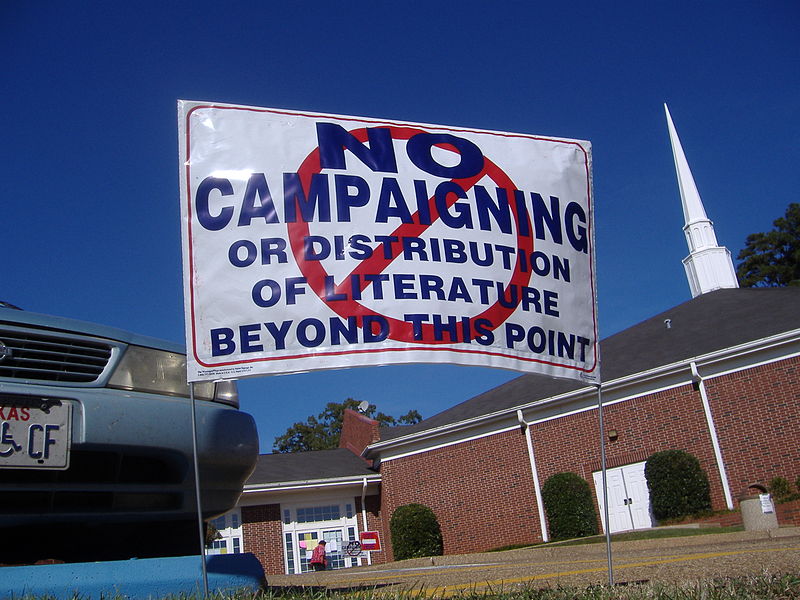 An atheist activist group has filed a federal lawsuit against the IRS for failing to investigate complaints lodged against a number of churches and religious organizations that have been accused of being involved in “electioneering” this past election season.
An atheist activist group has filed a federal lawsuit against the IRS for failing to investigate complaints lodged against a number of churches and religious organizations that have been accused of being involved in “electioneering” this past election season.
The Freedom from Religion Foundation (FFRF), headquartered in Madison, Wisconsin, says that many non-profit religious organizations have been “blatantly and deliberately flaunting the electioneering restrictions” of the IRS, but the government has not enforced its rules pertaining to the matter.
According to the IRS website, “Under the Internal Revenue Code, all section 501(c)(3) organizations are absolutely prohibited from directly or indirectly participating in, or intervening in, any political campaign on behalf of (or in opposition to) any candidate for elective public office. The prohibition applies to all campaigns including campaigns at the federal, state and local level. Violation of this prohibition may result in denial or revocation of tax-exempt status and the imposition of certain excise taxes.”
However, while candidates may not be promoted or opposed, churches and ministries that obtain 501 (c)(3) status may speak out on political and moral issues and/or generally encourage others to vote.
“Under federal tax law, section 501(c)(3) organizations may take positions on public policy issues, including issues that divide candidates in an election for public office,” the IRS outlines. “However, section 501(c)(3) organizations must avoid any issue advocacy that functions as political campaign intervention. Even if a statement does not expressly tell an audience to vote for or against a specific candidate, an organization delivering the statement is at risk of violating the political campaign intervention prohibition if there is any message favoring or opposing a candidate.”
In its lawsuit against the IRS, the Freedom from Religion Foundation cites a number of specific complaints regarding those that it believes violated these rules. It states that approximately 1,500 pastors took part in “Pulpit Freedom Sunday” last month, which was organized by the Christian legal group Alliance Defending Freedom (ADF). The organization urged churches to “preach a Biblically-based sermon regarding candidates and the election without fearing that the IRS will investigate or punish the church.”
It also takes issue with “blatantly partisan full-page ads” purchased by the Billy Graham Evangelistic Association prior to the election, which stated that Christians should vote for Biblical principles at the polls. Billy Graham had met with Republican presidential candidate Mitt Romney in October at his residence in North Carolina, where Graham told Romney, “I’ll do all I can to help you.”
Freedom From Religion Foundation also cited a number of Catholic priests that it believes broke the law as well by urging others to vote pro-life.
In total, the atheist organization said that it filed 27 complaints with the IRS and alleged that none were ever investigated. FFRF is asking a federal court to force IRS Commissioner Doug Shulman “to authorize a high-ranking official within the IRS to approve and initiate enforcement of the restrictions of §501(c)(3) against churches and religious organizations, including the electioneering restrictions, as required by law.”
However, the legal organization Alliance Defending Freedom says that the IRS regulation is unconstitutional and should be challenged.
“For almost the first 200 years of America’s history, pastors frequently spoke out with great boldness about the great moral and social issues of the day and about the candidates running for office,” ADF outlines on its Speak Up Movement website. “Yet today, the voice of the Church has been silenced by the Johnson Amendment – an unjust and unconstitutional law.”
“Pastors should decide what they preach from the pulpit, not the IRS,” added Senior Legal Counsel Erik Stanley. “It’s outrageous for pastors and churches to be threatened or punished by the government for applying Biblical teachings to all areas of life, including candidates and elections. The question is, ‘Who should decide the content of sermons: pastors or the IRS?'”
Other churches and non-profit organizations refuse to apply for 501 (c)(3) status because they would rather pay taxes than forfeit their freedom of speech.
“A church that voluntarily initiates an application to the state for corporate status expects ‘limited liability’ and ‘tax exemption”. It in turn owes to the state its right to exist and prosper,” states Art Fisher of Reformed Bible Church in Central Islip, New York, which has not applied for tax-exempt status. “It is obvious that its legal status and that of its of its ‘flock’ has been drastically altered.”
“Why are the churches of today almost always found to be incorporated? Why would the churches elect to place themselves under such jurisdiction — to find regulation under governmental franchise preferable to their own Divine Law?” he asked. “Are they not in fact serving two masters?”
The IRS declined requests for comment from reporters, stating that it does not discuss legal matters while they are before the courts.
Photo: Kushal One
Become a Christian News Network Supporter...


